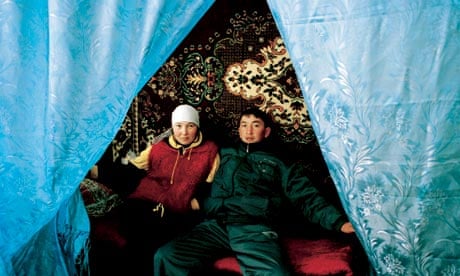A third of all marriages in modern Kyrgyzstan are kidnaps. Typically, a man abducts his bride by force or deception, enlisting his family to break her resistance to the wedding through hours of persuasion. If successful, the next morning the bride will sit quietly in a curtained-off area wearing the traditional white wedding headscarf and an imam will be called in to marry the couple.
The Kyrgyz phrase ala kachuu describes this process – literally, it means "grab and run". Some brides are kidnapped by strangers, others by men they know. Some escape after violent ordeals, but most are persuaded to stay by tradition and fear of scandal. In Muslim Kyrgyzstan, where virginity is revered, a girl who has been kidnapped and then leaves is considered to be tainted. If her family refuses to allow her back home because of the shame, she has few options. With their purity in question after a night spent at a man's house, many women accept what they believe is their fate.
Although the practice is said to have its roots in nomadic customs, the tradition remains at odds with modern Kyrgyzstan. Ala kachuu was outlawed during the Soviet era and remains illegal under the Kyrgyz criminal code, but since the country's declaration of independence in 1991, incidents have surged. Partly, this is because ala kachuu is seen as a symbol of a national identity denied by Soviet rule. But also, in this religious country, there are few opportunities for single men and women to meet and socialise. Parental pressure on a man to take a wife at a certain age remains strong and, compared with the expense of ritualistic weddings, kidnapping a bride is considered a cheaper alternative for his family, who traditionally pay for the wedding. Usually a kidnap is marked by a Muslim ceremony in the home, though some families hold a wedding party. An animal is slaughtered and celebrations can last up to a month. These marriages are rarely officially registered, however, leaving the bride with no rights to property or children.
After marriage, a bride is considered to belong to her husband's family, who pay for her education and living costs. So, often, the decision to leave a daughter with her kidnapper is an economic one. Even if the family do protest, they rarely prosecute, since corruption is rife in the justice system and the police are commonly paid off by the kidnapper and his family. Instead, the groom's family will visit the bride's family after the wedding to ask forgiveness for their son's actions, bringing with them gifts such as sheep, cattle or money, clothes, vodka and sweets .
